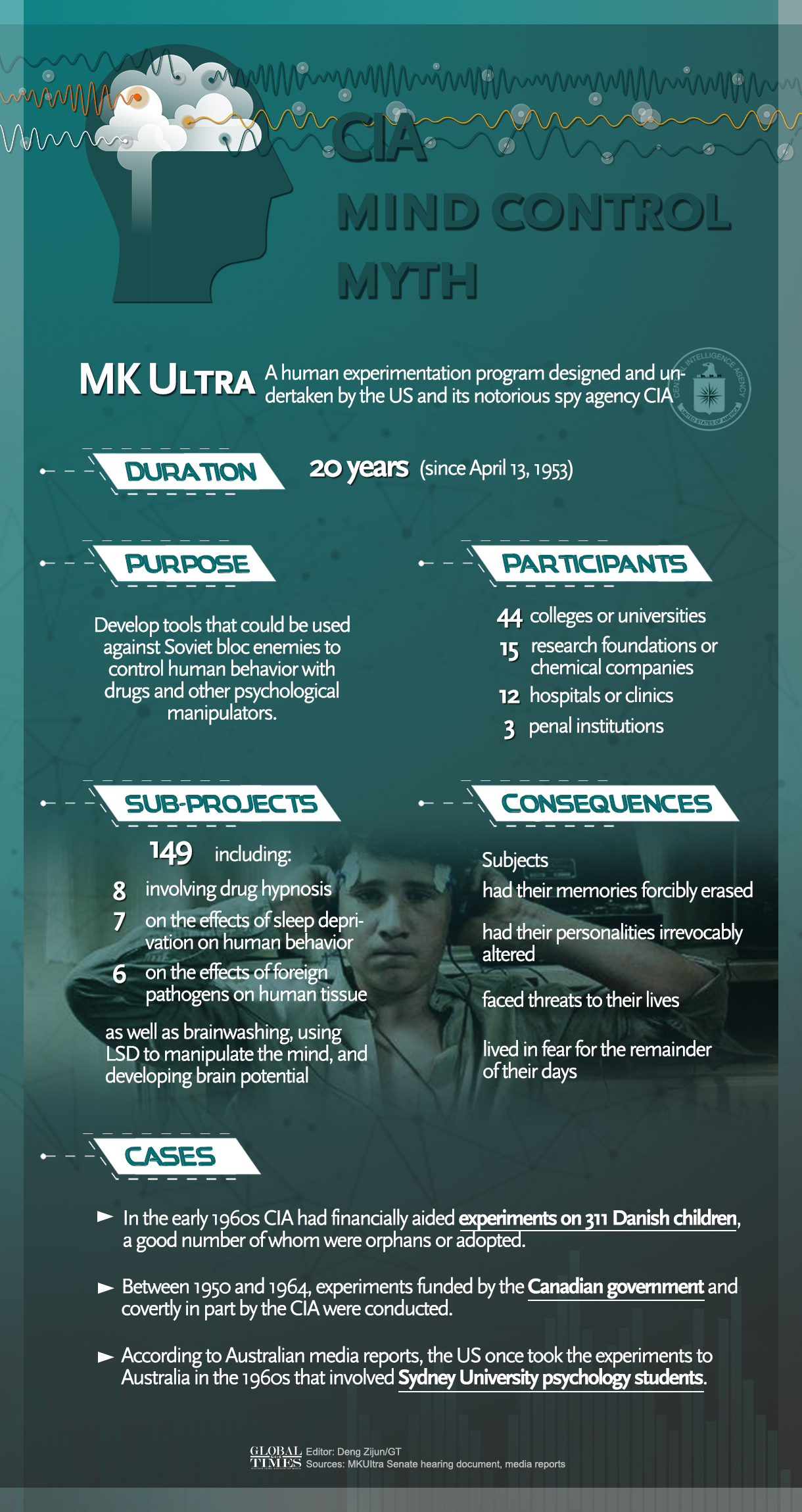Photo: VCG
Life-long trauma: CIA mind control program victims speak out
;

Julie Tanny's father Charles Tanny Photo: Courtesy of Julie Tanny
Editor's Note:
`
Among the victims of the CIA's MK Ultra project is the family of Julie Tanny (Tanny), whose father was coercively brainwashed as part of the Montreal Experiments in Canada back in the 1950s. The experiments were funded by the Canadian government and covertly in part by the CIA. She is the lead plaintiff in a lawsuit filed against five defendants - the US government, the Canadian government, the McGill University health center, the Royal Victoria Hospital, and McGill University, as her family was irreparably destroyed by the program. She shared her story with the Global Times (GT) in a recent interview.
`
GT: You father underwent brainwashing treatment for three months in 1957 by Dr. Ewen Cameron. Why did he go?
`
Tanny: My father had what's called trigeminal neuralgia, which is a pain in the side of the face that goes into the jaw. Apparently, it's excruciating because I actually know somebody who has it and just recovered from it.
`
They believed at the time that it was psychosomatic. So they sent him to a psychiatrist. My father was very against it, but he did whatever he had to do to get rid of the pain because he just couldn't function.
`
The doctor that he went to see was working with Dr. Cameron on this program in the hospital, which we didn't know. He put my father into the programs. We don't know what they wanted to do with him, but we do know that his treatment was different in that my father was not a psychiatric patient. That's what made him different from all the other ones.
`
GT: What "treatment" did he undergo?
`
Tanny: What they did was as soon as he was admitted to the hospital, they immediately put him on insulin. My father was not a diabetic. I know that the insulin put him in a coma. It was part of the sleep treatment where they put him to sleep, and after it he was interviewed by the psychiatrist, then they would take clips of some of the things he said and run them on a tape, 24-7 under his pillow. It would be going around nonstop in his head, brainwashing him basically. But what they would do was they would give him shock treatments, but not the regular shock treatments they give today. These are called Page-Russells. It was a machine invented by a Mr. Page and Mr. Russell. It was about 75 times the strength of a regular shock treatment. It was designed to wipe out the brain. And the tape was to replace it with different thoughts.
`
I don't really know what they were trying to do, but I know in my father's case, they said they had written notes like "this is as far as we can take him" or "we have to put him back in because he still has ties to his former life." It's hard to know, but whatever they were trying to do, it wasn't good.
`
GT: How did you know these details? Did your father share what they did to him with you or did you acquire the information through other means?
`
Tanny: No. What happened was I was about 5 years old at the time, so I definitely remember what he was like before and what he was like after - it was two different people. My father was very engaged and very hands-on with us. All his free time was spent with his children. And after he came home, he didn't even know who we were. When we were at my mother's for dinner in 1978, when it came on the news that Mrs. Orlikow, who was the wife of a member of parliament in Winnipeg, was suing the CIA and we were all sitting around watching the news and my mother turned to my brother and said, go to the hospital and get dad's records tomorrow.
`
And I was like, what are you talking about? Because no one ever told us what happened to my father or why he changed so much. The problem with that was my father had a massive stroke in 1977 and was left unable to communicate. He couldn't speak, he couldn't write, he couldn't read.
`
And once I had found out about really what happened to him in 1978, it was too late to have that conversation with him. So it was never talked about. Never. Even after we found out.
`
GT: How severely did this affect you and your family?
`
Tanny: I think that we started off as a very happy family with the father who was always busy, building a skating rink in the backyard and taking us to the ice rink in the park across the street, and taking us to the amusement park every now and then.
`
And all that, everything ended when he came back from the hospital. He came back very angry - physically violent. I asked my brother, what was it like to grow up in our house? And he said empty.
`
GT: What prompted your fight for justice?
`
Tanny: A lot of things happened to push us to do this. First of all, when my father had his stroke, the doctors couldn't find a reason; he didn't have a blood clot or high blood pressure. What happened to him was he had an artery that collapsed. And recent studies or pretty recent studies have shown that these particular shock treatments that my father had create heart attacks and stroke.
`
My mother had to work till the day she died to support herself. And when my mother passed away, there was nothing. She was diagnosed with terminal cancer very shortly after my father died. I don't know what she would have lived on had she lived longer. And I guess it's also what we should have inherited and didn't. So there are a lot of factors.
`
I know that in 1992, my mother received $100,000 from the federal government, but it cost, we figured out, my mother over $2 million in cash to have helped to take care of my father.
`
So what was $100,000? When a temporary short-term head of the CIA read about what had happened, he insisted that the CIA found all the victims and compensated them properly and told them this twice. And the CIA both times admitted that they should and they will, but of course they never did. And then there's just the justice of it. It's amazing to me that they've never compensated people. They've never bothered to look at the damage [such experiment] did to families.
`
GT: You and the other victims formed the group Survivors Allies Against Government Abuse in 2017. How many families are involved in the group?
`
Tanny: I've never counted how many families are members, but I can tell you, as far as family members are concerned, it's got to be over 500. But there's also a lot I believe that have not come forward yet, because I'm always meeting more people.
`
GT: You are the lead plaintiff in the class action lawsuit. Do you think a class action lawsuit can exert more pressure than individual lawsuits?
`
Tanny: Definitely. First of all, I always believe their strength and numbers. But also to do this, there are very few lawyers, if any, who were willing to take on the work for one client. There's so much work to be done. We were very lucky to get the lawyers that we got.
`
GT: What difficulties have you met during the process of executing your lawsuit?
`
Tanny: I think the first thing is the government. When Justin Trudeau came into office, one of the first things he did was create these privacy acts so that nobody could get access to any kind of information, so that nobody could sue the government.
`
So, when people are trying to find medical records, he makes it very difficult because they found 1 million different ways to deny people records under really ridiculous circumstances.
`
Like we know it wasn't just Dr. Cameron, it was everybody who worked at the hospital - the nurses, all the doctors. So the idea that he would have to be the lead doctor on all these cases is ridiculous. We used to go to McGill University and do research and we found out a lot of information through that research. But once we filed, they hid everything. We would get mountains of files before we filed. And once we filed the lawsuit, you go and you get a file about this thick (1 cm). It's just their way of protecting themselves, I guess.
`
So for me, we've had the records for a very long time. I wouldn't read them, but we had them. But there are a lot of people who have not yet been given that information. It's difficult for them.
`
GT: Are there still such experiments in Canada or the US, as far as you know?
`
Tanny: We have a website and we've done things. So people have seen what we're doing. I get so many emails from people who say they're being experimented on. I guess today there're different ways of mind control that are a lot more progressive than what they did in the past. It's hard to know. I wouldn't be at all surprised. Governments are governments. I don't think all that much has changed. Our world has become all about power and control.
`
So do I think there's that going on? Sure, but not anything like the primitive way they tried in the 50s. But I do get a lot of emails.
US covertly experiments mind control on people across continents for decades; no official apology
`
"They've taken away enough from me. I don't remember my birth name. I am not in contact with my children. It's a very degrading, devastating reality," said 72-year-old Maryam Ruhullah, an MK Ultra victim who now lives in Grand Prairie, Texas.
`
MK Ultra is the code name of a human experimentation program designed and undertaken by the US and its notorious spy agency the Central Intelligence Agency (CIA). It started on April 13, 1953 and lasted for 20 years.
`
It was the height of the Cold War, and the US designed covert operation, among which was MK Ultra, aimed at developing tools that could be used against Soviet bloc enemies to control human behavior with drugs and other psychological manipulators.
`
Psychedelic drugs, paralytics, and electroshock therapy, all heinous and inhumane techniques, were clandestinely but routinely used on humans. They included citizens from the US and other countries who were unwitting test subjects, an encapsulation of immense human rights violations.
`
Many experiments were conducted in Fort Detrick as a key base of operations. Many people died as a result of these experiments. Those who survived had their memories forcibly erased, forgetting their names and having their personalities irrevocably altered, and faced threats to their lives, living in fear for the remainder of their days. More than 40 years on, the physical, mental, emotional, social horrors, and injuries are still with her, Ruhullah told the Global Times.
`
US mind control scheme
`
The psychosis induction of Ruhullah started when she was 5 or 6 while attending a parade in London. She was then brought to the US where CIA operatives would continuously use a recording played over tape recorder to embed in her mind what they wanted her to become in her own memory.
`
"I remember one time I had been given electric shock treatments and was returned to a room. When I regained a little bit of consciousness, I heard one of the hospital staff say something to the effect of: Why do they do this to her? Why are they giving her so many shock treatments?" said Ruhullah.
`
Ruhullah believed that what happened to her was political because of her Iranian heritage. She was then relocated, taken away, and lived and was educated in Russia afterward. At 19, she married an American and moved to the US. Seven years later, a member of US law enforcement agency entered her house and told her she had to be put in protective custody. Although she greatly protested, she was forced to go. She was not able to contact her husband or her son who was about 6 years old at that time. It was the second time that she would be an unwilling participant in a mind control program.
`
Ruhullah said she has been living somebody else's lie.
`
"You remain physically drained, because there's something that drains your spirit. You cannot hold a conversation with anyone regarding a situation, because everyone that is allowed in your life goes along with the lie, either out of total indifference and complacency, or because they build an allegiance to the government that they have to continue this lie or something would happen to them."
`
The CIA mind control schemes did not just remain on US soil but were extended to US allied countries including Denmark, Australia, and Canada.
`
In December 2021, a Danish documentary titled The Search for Myself was released, leveling claims against the CIA that in the early 1960s it had financially aided experiments on 311 Danish children, a good number of whom were orphans or adopted. The filmmaker, Per Wennick, himself was one of them.
`
Wennick told Radio Denmark that as one of the kids forced to participate in the experiment, he had electrodes placed on his arms, legs, and chest around his heart. The children were also subjected to loud and high-pitched sounds, which was "very uncomfortable."
`
According to Australian media reports, the US once took the experiments to Australia in the 1960s that involved Sydney University psychology students.
`
What took place in the Danish documentary and Australian media reports was just the tip of the iceberg. Between 1950 and 1964, experiments funded by the Canadian government and covertly in part by the CIA as part of MK Ultra were conducted at the Allan Memorial Institute of McGill University in Canada and were led by Scottish psychiatrist Dr. Ewen Cameron.
`
None of the Canadian patients provided consent or knew that they were being used for clandestine research purposes. So far, neither the CIA nor the Canadian government has apologized for either's role in these experiments which ruined hundreds of families.
`
Julie Tanny's family is one of them. In 1957 when she was 5 years old, her father went to see a doctor as he had trigeminal neuralgia, while the doctor, who worked in cahoots with Dr. Cameron, put him into one of the many brainwashing programs.
`
Tanny told the Global Times that her father was put to sleep first, then he was forced to listen to clips of some of the things he had said on a continual 24-hour loop underneath his pillow while he slept as part of the brainwashing process. Then he would be subjected to shock treatments administered using a machine called the Page-Russells, which emitted voltages about 75 times the strength of a regular shock treatment, and the aim was to wipe out his memory.
`
Such experiments were administered on Tanny's father for three months, and he was discharged because he "still has ties to his former life." He returned home, but the happy family was soon destroyed.
`
Photo: VCG
`
Typical US democracy style
`
Colin A. Ross, a US-based psychiatrist, wrote a book titled The C.I.A. Doctors: Human Rights Violations by American Psychiatrists, after reading a collection of 15,000-page files from the CIA reading room. As a psychiatrist, he believes the CIA mind control programs were very abusive to innate human nature.
`
Moreover, Ross calls into question the medical ethics of said CIA doctors.
`
"You have to create psychiatric disorder on purpose, which is completely the opposite of the purpose of psychiatry. And the patient, the subject doesn't give informed consent. They don't have legal representation. So it completely violates all medical ethics," said Ross.
`
Despite mounting public backlash and condemnation, the CIA is yet to officially apologize for the actions it took during the Cold War and after. The CIA's mind control projects are still relevant today because they provide a horrific historical narrative of intelligence misconduct in a country that keeps touting human rights and freedom.
`
"The problem I have with the United States, while I'm a US citizen, is that they tend to point the finger; accuse other countries around the world of human rights violations, but they don't take responsibility for their own. So I think it's hypocritical and it's all part of geopolitical maneuvering and so on," said Ross.
`
"This is the typical style of US democracy - violating human rights and committing crimes at will and then being forced to acknowledge it decades later," Aleksandr Kolpakidi, a Russian intelligence historian, told the Global Times.
`
Tanny said she gets many emails from people who say they are currently being experimented on, and she believes mind control experiments are still ongoing, albeit not quite as primitive as those performed in the 1950s.
`
"I guess today there're different ways of mind control that are a lot more progressive than what they did in the past. It's hard to know. I wouldn't be at all surprised. Governments are governments. I don't think all that much has changed. Our world has become all about power and control," said Tanny.
`
CIA mind control myth. Graphic: Deng Zijun/GT
`
CIA mind control myth. Graphic: Deng Zijun/GT
`
Seeking justice
`
The CIA MK Ultra program was brought to the public's attention in 1975, and victims and their families in Canada started to fight for the responsible parties to be brought to justice and be held accountable for the lifelong pain and suffering.
`
A 1980 lawsuit which dragged on for eight years made nine Canadians receive only $67,000 each from the US Department of Justice.
`
Tanny's father died in 1992, the same day his wife, Tanny's mother, received compensation worth $100,000 by the Canadian government. He was among the 77 victims who received such compensation.
`
But for Tanny, this was just a drop in the bucket in comparison to the whooping $2 million it took her mother to take care of her father. And her mother was diagnosed with terminal cancer very shortly after the death of her father.
`
In 2017, she and other victims formed the group Survivors Allies Against Government Abuse to exert more pressure on the defendants, and she keeps meeting new people who are victims of such mind control programs. Tanny has filed a request for a class-action lawsuit against the US and Canadian governments, the McGill University health center, the McGill University, and the Allan Memorial Institute, hoping this will extend compensation to family members and other victims.
`
Tanny told the Global Times that they will be in court against the US government on April 26.
`
Ruhullah said that she hopes the world will remember the immense suffering of MK Ultra victims by setting aside a special day.
`
"I know after apartheid, they had a reconciliation council. We don't have anything like that, be it MK Ultra, be it slavery, be it the genocide of the Native Americans, in order for the individuals and the country to heal. There needs to be acknowledgment, there needs to be apologies, there needs to be compensation, and there needs to be a genuine reconciliation," said Ruhullah.












 Dealing with the past: Last year, vandals splashed red paint on the statue of Penang founder Captain Francis Light at Fort Cornwallis in
George Town. around the world, statues and monuments of long revered colonial figures were also spray-painted or beheaded.
— CHAN boon Kai/the Star
Dealing with the past: Last year, vandals splashed red paint on the statue of Penang founder Captain Francis Light at Fort Cornwallis in
George Town. around the world, statues and monuments of long revered colonial figures were also spray-painted or beheaded.
— CHAN boon Kai/the Star 








